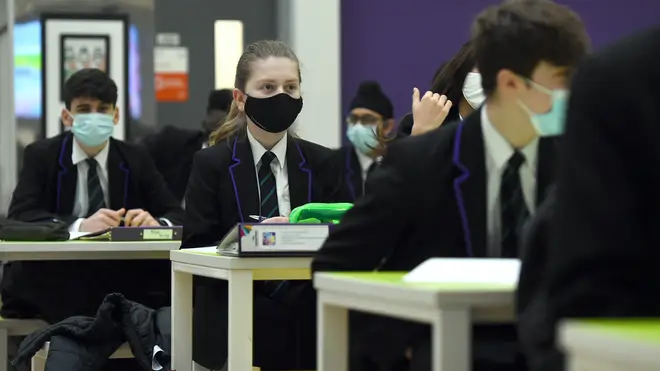
Richard Spurr 1am - 4am
27 July 2021, 16:29 | Updated: 27 July 2021, 19:08

A record 1.13 million children in England were out of school for Covid-related reasons towards the end of term, government figures show.
Around 1,126,000 pupils missed class on Friday 16 July, according to Department for Education (DfE) statistics.
This was a record high since all students returned in March, and compares with 859,000 on Friday 9 July.
READ MORE: Boris Johnson warns against 'premature conclusions' as Covid cases drop
READ MORE: At least 10 more countries 'could be added to travel green list' in next review
The figures include 994,000 children self-isolating due to a possible contact with a Covid-19 case, 48,000 pupils with a confirmed case of coronavirus, and 33,300 with a suspected case.
A further 50,700 pupils were off as a result of school closures due to Covid-related reasons.
Current rules say that children have to self-isolate for 10 days if another pupil in their bubble - which can be an entire year group at secondary school - tests positive for coronavirus.
But Education Secretary Gavin Williamson has announced that the use of "bubbles" in schools in England will come to an end as the country eases lockdown restrictions.

Gavin Williamson announces an end to the bubble system in schools
From 16 August, children in England will only need to self-isolate if they have tested positive for coronavirus.
A study released last week found that daily testing of pupils who have been in contact with someone with Covid-19, rather than isolating whole groups, may be just as effective in controlling transmission in secondary schools.
Researchers at the University of Oxford estimated that daily Covid testing in schools - as an alternative to the 10-day contact isolation policy - can reduce coronavirus-related school absences by 39%.
The DfE also released a regional breakdown of absences in state schools in England from 10 June to 15 July. These have been adjusted to exclude those Year 11-13 students not expected to attend because they are off-site.
The highest rate of Covid-related absence was more than one in four (26.5%) in the North East on 15 July, while London had the lowest (9.6%).
The North East also had the highest staff absences on 15 July, with 11.1% of teachers and school leaders - and 11% of teaching assistants or other staff - absent for Covid-related reasons.
This compares with 6.6% of teachers and school leaders - and 6.4% teaching assistants or other staff - absent for Covid-reasons nationally on 15 July.

PM warns against drawing 'premature conclusions' from falling cases
Geoff Barton, general secretary of the Association of School and College Leaders (ASCL), said: "Two things must happen. One, the Government must put a much greater focus on putting an end to educational disruption in the autumn term and provide more support to schools and colleges. Two, it must also provide a much more ambitious and better funded recovery plan to address the learning loss experienced by many pupils during the pandemic."
Paul Whiteman, general secretary of school leaders' union NAHT, said: "It is clear that this level of disruption cannot continue next year. However, the Government needs to address the root cause of the problem, and not just the symptoms.
"Removing the requirement for close contacts to automatically self-isolate will no doubt reduce absence figures, but it is important the Government does more to actively reduce case numbers amongst children and transmission in schools."
Dr Mary Bousted, joint general secretary of the National Education Union (NEU), added: "The Government must learn from their sorry record this term.
"They must move now to announce what mitigations will be in place for September around mass testing, improvements to ventilation and testing of close contacts of children who have Covid."
A DfE spokeswoman said: "Where children needed to isolate last term, schools were required to offer immediate access to high-quality remote education.
"As of step 4, schools no longer need to operate a bubble system, and from 16 August pupils will not need to self-isolate should they come into contact with a positive case, in line with the position for wider society."